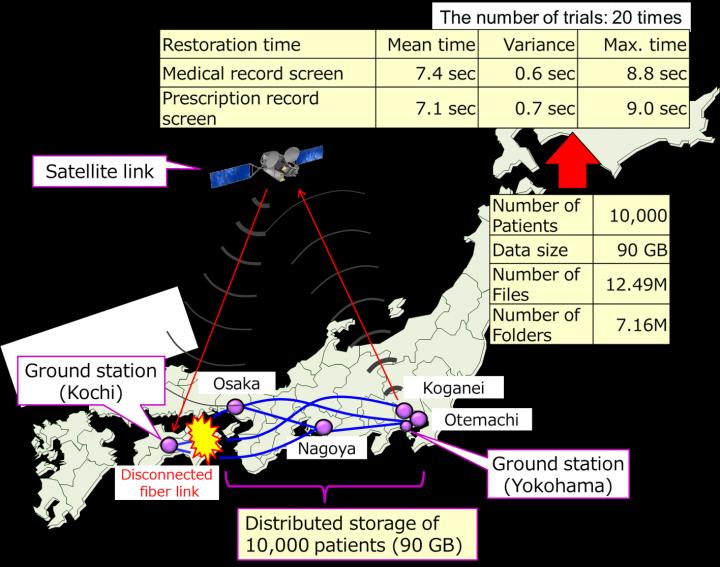Prompt restoration of medical records via a satellite link for disaster medical support

Credit: National Institute of Information and Communications technology
Highlights
- – Secure data backup of medical records based on secret sharing
– Restoration of medical records via a satellite link within 9 sec after searching a patient ID
– Cross reference of medical records between different organizations using standardized data format
Abstract
The National Institute of Information and Communications Technology (NICT, President: Hideyuki Tokuda, Ph.D.), Kochi Health Science Center (KHSC, Director: Yasuhiro Shimada) and collaborating teams have developed a secure data backup system in an 800 km network connecting the data servers in Kochi, Osaka, Nagoya, Otemachi and Koganei, Japan, using secret sharing and secure communications technologies, and demonstrated distributed storage of medical records and prompt restoration of important items, such as prescription records and allergy information, via a satellite link within a time as short as 9 sec.
This technology would be useful for medical support in disaster situations as well as sharing and cross referencing medical records between various hospitals in ordinary situations.
The results will be presented in the session of quantum communication on December 16 in the EU-USA-Japan International Symposium on Quantum Technology 2019 held in Kyoto, Japan.
Background
In the Great East Japan Earthquake in 2011, many medical institutions were destroyed and data servers storing medical records were washed away by tsunami waters. It was then recognized that medical records should be backed up in remote places safely for such contingencies. In the case of emergency care after a disaster, medical examinations and treatment should be given to many people in a short time. During these times, there is a need to promptly restore a minimum of necessary items to profile a patient, such as prescription records and allergy information.
Medical records are highly confidential personal information. Therefore, the backup of medical records should be protected by appropriate security techniques. Furthermore, if the backup conforms to a common standardized data format, they can be shared and cross referenced by many medical institutions to prevent duplicated examination and excessive medication as well as to develop new medical technologies.
So far, no techniques have been available which satisfy all these requirements at once.
Achievements
We combined secret sharing and secure communications technologies to realize a secure data backup system and demonstrated distributed storage of medical records and prompt restoration of important items, such as prescription records and allergy information, via a satellite link. This system is referred to as the Healthcare Long-term INtegrity and Confidentiality protection System (H-LINCOS).
This H-LINCOS has been implemented in an 800 km network connecting the data servers in KHSC, and the access points of a high-speed R&D network testbed called JGN operated by NICT, which are located in Osaka, Nagoya, Otemachi, and Koganei (see Figure 1). To realize highly secure access control to the H-LINCOS, authentication functions are also implemented, using next generation technologies of quantum-safe public-key cryptography, which is expected to be secure even against quantum computer attacks.
In this experiment, sample data of medical records of 10,000 patients were provided by KHSC, whose total data size was 90 GB, converted into the standardized data format for medical information exchange (SS-MIX), and stored in a distributed manner in the H-LINCOS. In the demonstration of data recovery, we assumed that the Kochi area was damaged by a disaster, and terrestrial communication links to the Kochi area were disconnected. Under this scenario, a satellite link provided by SKY Perfect JSAT was introduced to the H-LINCOS connecting the ground stations in Yokohama and KHSC. Upon a query for a patient data item from a terminal device in KHSC, the original data was first restored in the Koganei data server by combining data pieces from two data servers in Osaka, Nagoya or Otemachi. The restored data was then sent to the Yokohama ground station, relayed to the KHSC ground station via the satellite link, and finally delivered to the terminal device in KHSC.
We could successfully restore important items, such as prescription records and allergy information, and display them on a screen within a time as short as 9 sec after the query. An allowable time to wait for information acquisition in emergency medicine is typically 15 sec. Our result satisfied this criterion. Our technology enables prompt delivery of medical information in disaster situations. It also provides a means to share and cross reference medical records between various hospitals in ordinary situations.
Future Prospects
We will further improve the performance and the reliability of the H-LINCOS. In particular, we will analyze communication latencies and H-LINCOS congestion when the stored data size and the number of connected terminal devices to access increase. We will also investigate efficient healthcare support in disaster situations by jointly operating the H-LINCOS and the Disaster/Digital information system for Health and well-being (D24H).
###
Media Contact
Sachiko Hirota
[email protected]
Original Source
https:/




